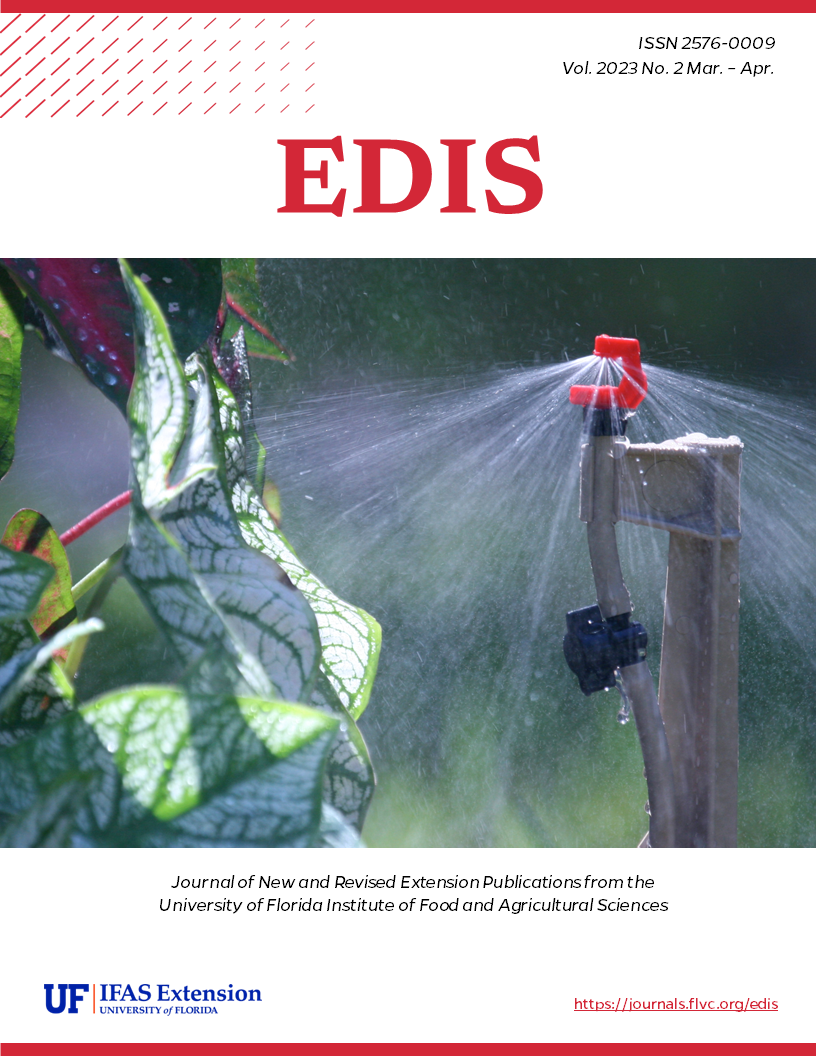Abstract
Florida is experiencing environmental challenges such as climate change, sea-level rise, and urbanization that make it difficult to develop management and policy actions to conserve our ecosystems and their goods and services, which are vital for human well being. Scenario planning is a useful tool to explore and cope with the uncertainties surrounding the future consequences of decisions, but it remains underused in Extension practices. This publication provides an overview of scenario planning and the conditions under which scenario planning can be useful. It explains how to construct and develop effective scenarios for decision making and provides illustrated, real-world examples across different scales. The goal is to introduce the concept of scenario planning to Extension and elaborate its potential to be incorporated into existing Extension programs to help develop robust, sustainable solutions to manage agriculture, ecosystem services, and natural resources in Florida.
References
Alcamo, J. 2008. Environmental Futures: The Practice of Environmental Scenario Analysis. Elsevier, Oxford, United Kingdom.
Berkhout, F., J. Hertin, and A. Jordan. 2002. Socio-economic futures in climate change impact assessment: using scenarios as 'learning machines.' Global Environmental Change 12:83-95. https://doi.org/10.1016/S0959-3780(02)00006-7
Booth, E. G., J. Qiu, S. R. Carpenter, J. Schatz, X. Chen, C. J. Kucharik, S. P. Loheide II, M. M. Motew, J. M. Seifert, and M. G. Turner. 2016. From qualitative to quantitative environmental scenarios: translating storylines into biophysical modeling inputs at the watershed scale. Environmental Modelling & Software 85:80-97. https://doi.org/10.1016/j.envsoft.2016.08.008
Carpenter, S. R., E. M. Bennett, and G. D. Peterson. 2006. Scenarios for ecosystem services: an overview. Ecology and Society 11. https://doi.org/10.5751/ES-01610-110129
Carpenter, S. R., E. G. Booth, S. Gillon, C. J. Kucharik, S. Loheide, A. S. Mase, M. Motew, J. Qiu, A. R. Rissman, J. Seifert, E. Soylu, M. Turner, and C. B. Wardropper. 2015. Plausible futures of a social-ecological system: Yahara watershed, Wisconsin, USA. Ecology and Society 20. https://doi.org/10.5751/ES-07433-200210
Carpenter, S. R., H. A. Mooney, J. Agard, D. Capistrano, R. S. DeFries, S. Díaz, T. Dietz, A. K. Duraiappah, A. Oteng-Yeboah, H. M. Pereira, C. Perrings, W. V. Reid, J. Sarukhan, R. J. Scholes, and A. Whyte. 2009. Science for managing ecosystem services: Beyond the Millennium Ecosystem Assessment. Proceedings of the National Academy of Sciences 106:1305-1312. https://doi.org/10.1073/pnas.0808772106
Folke, C., S. Carpenter, B. Walker, M. Scheffer, T. Elmqvist, L. Gunderson, and C. S. Holling. 2004. Regime Shifts, Resilience, and Biodiversity in Ecosystem Management. Annual Review of Ecology, Evolution, and Systematics 35:557-581. https://doi.org/10.1146/annurev.ecolsys.35.021103.105711
IPBES. 2019. Global assessment report on biodiversity and ecosystem services of the Intergovernmental Science-Policy Platform on Biodiversity and Ecosystem Services. E. S. Brondizio, J. Settele, S. Díaz, and H. T. Ngo (editors). IPBES secretariat, Bonn, Germany. XXX pages.
Kim, J. M., Y. U. Jeon, K. T. Son, J. H. Lim, and J. K. Park. 2017. Prospect of the Future of Agricultural Extension Service Using the Scenario Planning. Journal of Agricultural Education and Human Resource Development.
Kok, K., R. (Oonsie) Biggs, and M. Zurek. 2007. Methods for Developing Multiscale Participatory Scenarios: Insights from Southern Africa and Europe. Ecology and Society 12. https://doi.org/10.5751/ES-01971-120108
MacCracken, M. 2001. Prediction versus projection-forecast versus possibility. WeatherZine 26:1-29.
MEA. 2005a. Ecosystems and Human Well-being: Synthesis. Island Press, Washington, DC.
MEA. 2005b. Ecosystems and Human Well-Being: Scenarios. Island Press, Washington, DC.
Oteros-Rozas, E., B. Martín-López, T. M. Daw, E. L. Bohensky, J. R. A. Butler, R. Hill, J. Martin-Ortega, A. Quinlan, F. Ravera, I. Ruiz-Mallén, M. Thyresson, J. Mistry, I. Palomo, G. D. Peterson, T. Plieninger, K. A. Waylen, D. M. Beach, I. C. Bohnet, M. Hamann, J. Hanspach, K. Hubacek, S. Lavorel, and S. P. Vilardy. 2015. Participatory scenario planning in place-based social-ecological research: insights and experiences from 23 case studies. Ecology and Society 20. https://doi.org/10.5751/ES-07985-200432
Peterson, G. D., G. S. Cumming, and S. R. Carpenter. 2003. Scenario Planning: a Tool for Conservation in an Uncertain World. Conservation Biology 17:358-366. https://doi.org/10.1046/j.1523-1739.2003.01491.x
Polasky, S., S. R. Carpenter, C. Folke, and B. Keeler. 2011. Decision-making under great uncertainty: environmental management in an era of global change. Trends in Ecology & Evolution 26:398-404. https://doi.org/10.1016/j.tree.2011.04.007
Qiu, J., S. R. Carpenter, E. G. Booth, M. Motew, S. C. Zipper, C. J. Kucharik, X. Chen, S. P. Loheide, J. Seifert, and M. G. Turner. 2018. Scenarios reveal pathways to sustain future ecosystem services in an agricultural landscape. Ecological Applications 28:119-134. https://doi.org/10.1002/eap.1633
Raskin, P. D. 2005. Global Scenarios: Background Review for the Millennium Ecosystem Assessment. Ecosystems 8:133-142. https://doi.org/10.1007/s10021-004-0074-2
Reed, M. S., J. Kenter, A. Bonn, K. Broad, T. P. Burt, I. R. Fazey, E. D. G. Fraser, K. Hubacek, D. Nainggolan, and C. H. Quinn. 2013. Participatory scenario development for environmental management: A methodological framework illustrated with experience from the UK uplands. Journal of environmental management 128:345-362. https://doi.org/10.1016/j.jenvman.2013.05.016
Renn, O. 2006. Participatory processes for designing environmental policies. Land use policy 23:34-43. https://doi.org/10.1016/j.landusepol.2004.08.005
Sarewitz, D. R., R. Pielke, and R. Byerly. 2000. Prediction: science, decision making, and the future of nature. Island Press.
Schoemaker, P. J. 1991. When and how to use scenario planning: a heuristic approach with illustration. Journal of forecasting 10:549-564. https://doi.org/10.1002/for.3980100602
Thompson, J. R., A. Wiek, F. J. Swanson, S. R. Carpenter, N. Fresco, T. Hollingsworth, T. A. Spies, and D. R. Foster. 2012. Scenario Studies as a Synthetic and Integrative Research Activity for Long-Term Ecological Research. BioScience 62:367-376. https://doi.org/10.1525/bio.2012.62.4.8
Wardropper, C. B., A. S. Mase, J. Qiu, P. Kohl, E. G. Booth, and A. R. Rissman. 2020. Ecological worldview, agricultural or natural resource-based activities, and geography affect perceived importance of ecosystem services. Landscape and Urban Planning 197:103768. https://doi.org/10.1016/j.landurbplan.2020.103768

